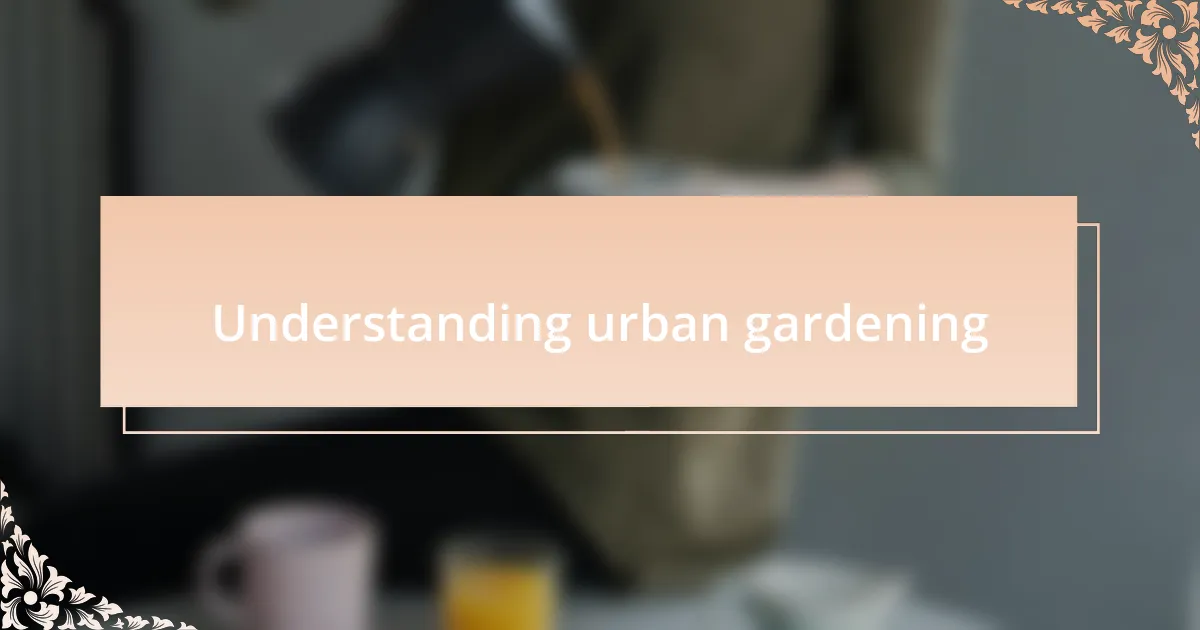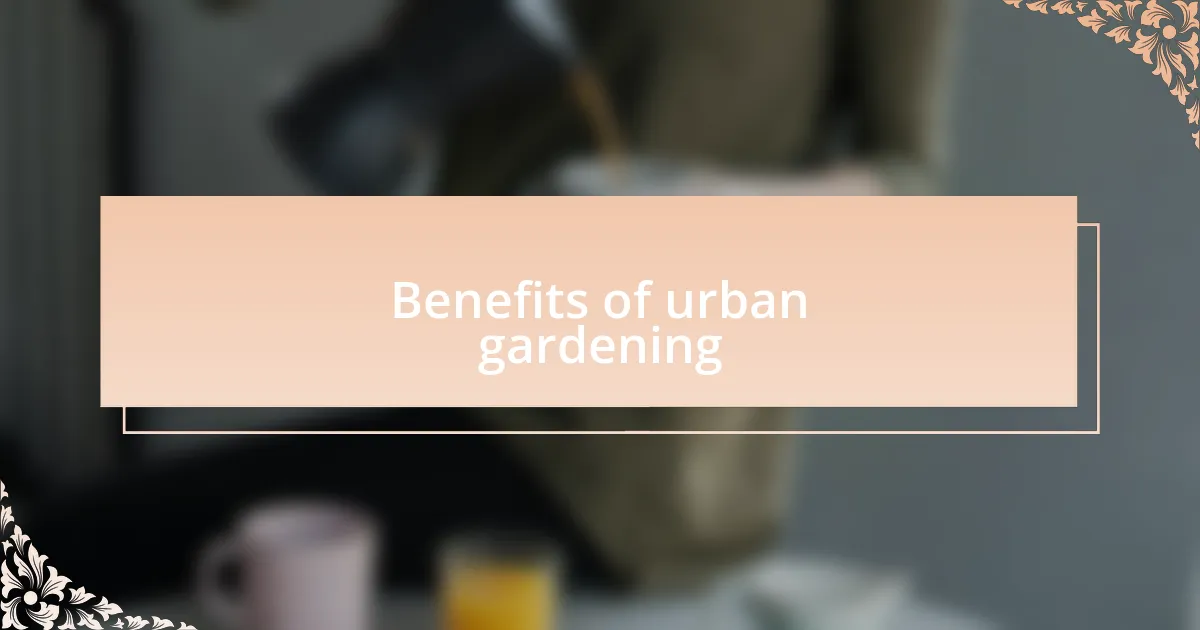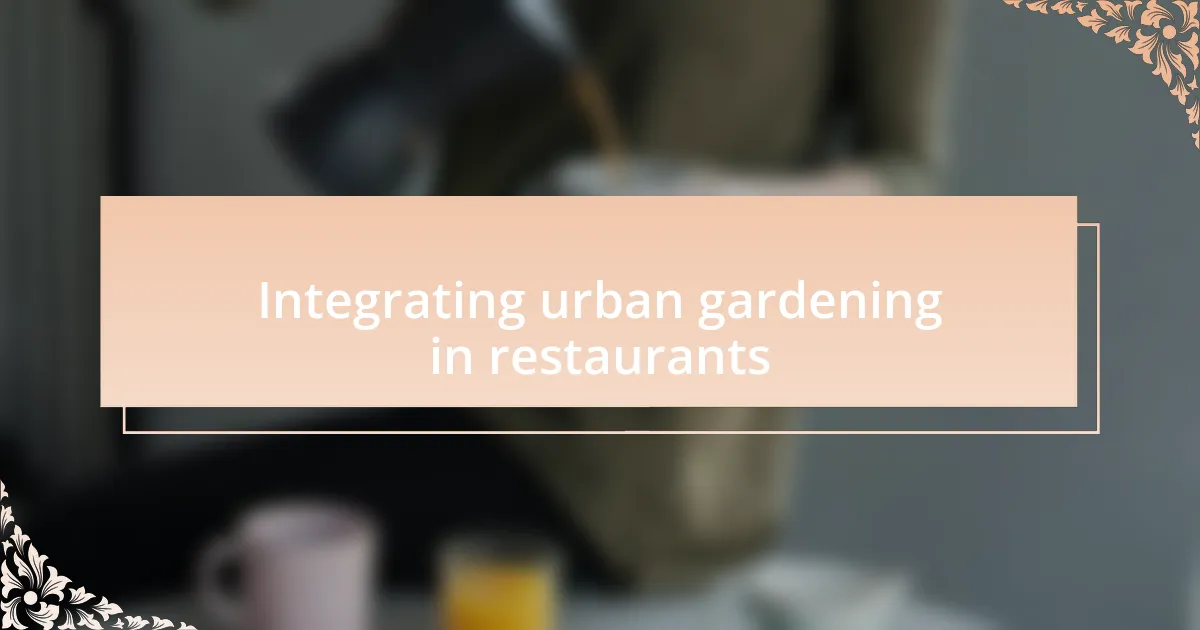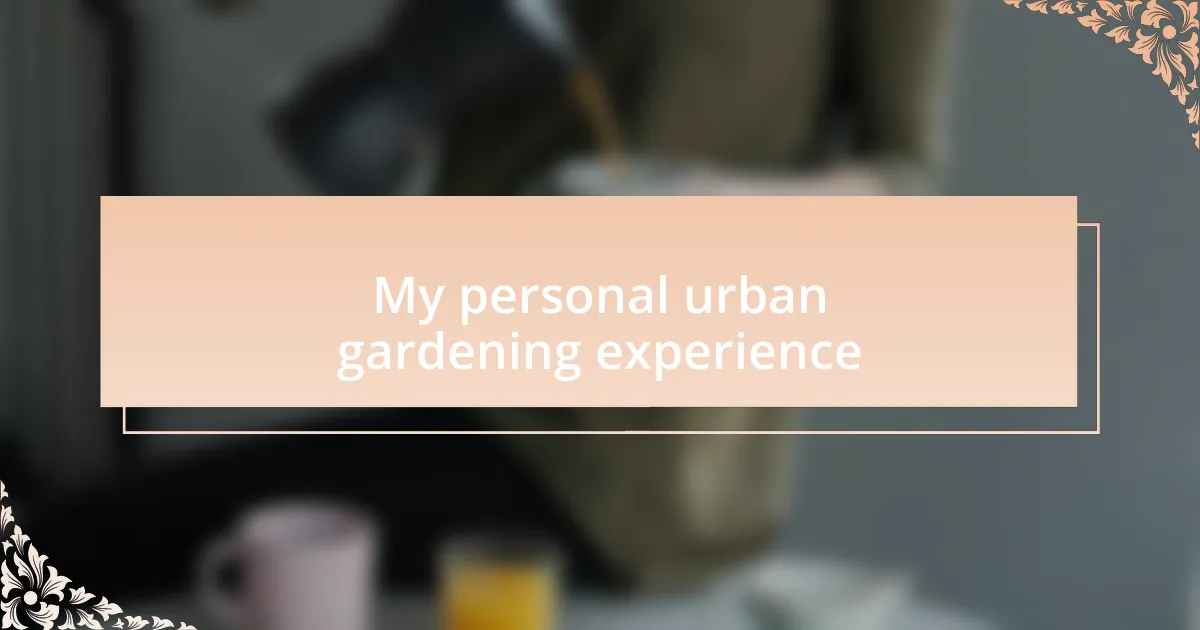Key takeaways:
- Urban gardening transforms urban environments into green spaces, promoting community interaction and emotional well-being.
- It allows individuals to grow their own food, contributing to environmental sustainability and enhancing personal creativity.
- Restaurants benefit from urban gardening by offering fresh, on-site ingredients that create a meaningful connection between diners and their meals.
- Personal experiences in urban gardening foster camaraderie and teach valuable lessons about nature and food, especially among families.

Understanding urban gardening
Urban gardening has become a beautiful movement that transforms concrete jungles into lush green spaces. I remember my first attempt at growing herbs on my balcony. It was thrilling to see tiny sprouts emerge from the soil, a reminder that nature can thrive even in limited space. Doesn’t it make you wonder how something as simple as a pot of basil can connect us to the earth in such a busy environment?
At its core, urban gardening is about utilizing available space creatively. Whether it’s vertical gardens on a wall or container gardens on a rooftop, the options are endless. I often think about how these small green patches can change the atmosphere of a neighborhood, providing not just food, but also joy and community interaction. Have you ever noticed how a garden can draw people together, sparking friendships over freshly picked tomatoes or shared gardening tips?
Moreover, urban gardening holds significant emotional value. It’s not just about cultivating plants but nurturing a sense of purpose. The calming effect of tending to a plant has been my refuge from daily stress. Have you ever found solace in the simple act of watering a flowering pot? It promotes mindfulness in a busy world and helps us reconnect with ourselves and our surroundings.

Benefits of urban gardening
Urban gardening offers numerous benefits that resonate deeply with anyone who has taken the plunge into this green endeavor. It allows individuals to grow their own food, which can be a rewarding experience. I still remember the first time I harvested tomatoes from my small kitchen garden—there’s nothing quite like the taste of homegrown produce! Have you ever bitten into a sun-ripened tomato and felt it burst with flavor on your palate? That freshness is something you can’t replicate with store-bought options.
Additionally, urban gardening contributes to environmental sustainability, helping to combat urban heat and improve air quality. For instance, I once read about a community garden that significantly lowered the temperatures of its surrounding area. It’s fascinating how plants can cool down a block, making it a more pleasant place for everyone. Isn’t it rejuvenating to think that by engaging in gardening, we are actively participating in creating a better environment for our neighbors?
On a more personal level, urban gardening promotes well-being and creativity. I often find myself lost in thought while tending to my plants, allowing my mind to wander and solve everyday challenges. It’s like a mini-meditation session, right there on my balcony. Have you ever felt that rush of inspiration while surrounded by greenery? It’s a simple act that can lead to profound moments of clarity, illustrating just how transformative urban gardening can be in our lives.

Integrating urban gardening in restaurants
Urban gardening can play a pivotal role in the restaurant experience, offering fresh insights into farm-to-table dining. I remember my first visit to a restaurant that grew its herbs on-site; the aroma wafting through the air was intoxicating. Have you ever savored a dish and wondered how the ingredients could possibly taste that fresh? It’s a delightful connection that urban gardening fosters between diners and their meals.
Imagine the impact of having a rooftop garden supplying vibrant vegetables and aromatic herbs directly to the kitchen. I can still recall the vibrant colors of the heirloom tomatoes and basil I grew on my rooftop. Seeing those ingredients transform into a flavorful dish was profoundly satisfying. When you source ingredients this way, it not only enhances the flavor but also tells a story—a narrative of sustainability and care for the community.
Moreover, engaging diners in the urban gardening process provides an interactive aspect that elevates their overall experience. I once attended an open garden event at a local eatery where guests could pick their own herbs to accompany their meals. That sense of involvement created a unique bond with the food, transforming a simple meal into a participatory celebration of nature. How many times do we get the chance to connect to our food at such an intimate level? It’s a powerful reminder that food is not just about nutrition; it’s about the relationships we build along the way.

My personal urban gardening experience
I started my urban gardening journey on a small balcony, filled with pots of herbs and vegetables. One summer evening, I decided to use my freshly harvested basil in a pasta dish. The way it transformed the meal was an epiphany for me; I had literally tasted the effort and love I poured into my garden. Have you ever experienced that moment when the flavors burst in your mouth, and you’re suddenly aware of the journey your food has taken?
As my confidence grew, I expanded to a community garden, where I met people from all walks of life. Sharing our successes and failures felt like an instant bond, creating a sense of camaraderie I’d never anticipated. I remember when the tomatoes ripened; we had a little celebration, a potluck featuring our homegrown produce. Has there ever been a better way to connect with neighbors than through the bounty of urban soil?
One of the most memorable aspects has been the sheer joy of teaching my kids about gardening. I still smile at the sight of their tiny hands gently planting seeds and watching them sprout over the weeks. It’s fulfilling to witness their excitement as they dig into the earth and later savor the fruits of their labor. In a world where everything moves so fast, doesn’t it feel good to slow down and get our hands dirty together?